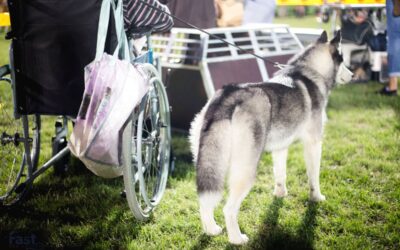Can Psychiatric Service Dogs Improve Geriatric Mental Health?


Why Geriatric Mental Health Matters?
Mental health issues in the elderly often go undiagnosed or are overlooked. For older adults, dealing with anxiety, depression, or even early cognitive challenges can be isolating and daunting. Without proper support, these conditions can worsen, impacting quality of life and physical health. Addressing geriatric mental health challenges is essential for holistic well-being.
The most common mental health conditions in seniors include:
- Anxiety and depression
- Social isolation
- Early stages of cognitive decline or memory-related challenges
The good news? A psychiatric service dog for seniors can help alleviate these symptoms by providing reliable, non-judgmental companionship.
How Can Psychiatric Dogs Help Geriatric Mental Health?
For seniors experiencing mental health challenges, psychiatric service dogs (PSDs) provide more than just companionship—they’re trained to offer practical support tailored to the unique needs of older adults. A psychiatric service dog can play a crucial role in helping manage symptoms associated with conditions like anxiety, depression, or cognitive decline by offering a stabilizing, constant presence. Through highly specialized training, these dogs go beyond emotional support to perform specific tasks that ease everyday struggles, especially in later life.
These dogs can be trained to:
- Interrupt anxiety or panic attacks, providing immediate comfort and distraction.
- Offer grounding techniques during emotional distress, such as applying gentle pressure or nudging.
- Remind their owners to take medication, which is vital for seniors who may have memory challenges.
- Help with physical stability, especially for those prone to disorientation or balance issues.
Through these skills, a psychiatric service dog offers seniors both emotional and physical security, helping them regain control over their daily routines and promoting mental clarity.
Imagine the peace of mind that comes with knowing a devoted companion is always there to assist—this kind of stability is invaluable for those facing the unique mental health challenges of aging.
What Are the Psychological and Physical Benefits of Psychiatric Service Dogs for Seniors?
1. Enhancing Physical Health Through Routine
2. Addressing Mobility Challenges
3. Cognitive Support
4. Reducing Social Isolation and Improving Routine Stability
5. Helps In Building New Connections
6. Boosting Confidence and Independence
Can Psychiatric Service Dogs Help with Dementia?
Key Benefits of PSDs for Dementia Patients:
- Routine Reminders: PSDs can remind their handlers to engage in daily routines, such as medication reminders or alerting them to eat or drink.
- Guidance and Stability: For seniors prone to disorientation, a psychiatric service dog can guide them back home if they become confused or lead them safely within familiar environments.
- Reducing Agitation: Many dementia patients experience moments of frustration or agitation. PSDs offer a calming influence, using gentle touches or leaning on their owner to reduce stress and provide comfort.
Do Psychiatric Service Dogs Reduce Symptoms of Depression or Anxiety?
How PSDs Help with Depression and Anxiety in Seniors
- Interrupting Negative Thought Patterns: During moments of intense anxiety or depressive thoughts, PSDs can interrupt these patterns by nudging or applying pressure to help shift focus.
- Promoting Daily Activity: Regular walks and interaction with a PSD encourage physical activity, which is beneficial for mental health and can help improve mood and reduce depressive symptoms.
- Offering Unconditional Companionship: Feelings of isolation are common in seniors, and psychiatric service dogs provide loyal companionship, helping seniors feel less alone and more supported.
How Service Dogs Can Help Prevent Hospitalization in Elderly Patients?
Why Do Seniors and Service Dogs Connect So Well?
Rights and Protections for Seniors with Psychiatric Service Dogs
Seniors with psychiatric service dogs (PSDs) are protected under the Americans with Disabilities Act (ADA), Fair Housing Act (FHA), and Air Carrier Access Act (ACAA) which ensures their right to access housing, public spaces, and transportation.
- Americans with Disabilities Act (ADA): Grants seniors the right to have their psychiatric service dogs (PSDs) in public spaces, including restaurants, stores, and healthcare facilities.
- Fair Housing Act (FHA): Protects seniors with PSDs in housing situations, allowing service dogs in residences with pet restrictions.
- Air Carrier Access Act (ACAA): Permits PSDs to accompany seniors on flights, often without additional fees, ensuring they can travel with essential support.
These protections help seniors and caregivers advocate for the presence of PSDs, reducing potential misunderstandings and ensuring fair treatment in public and private spaces.
How to Get a Psychiatric Service Dog for Geriatric Mental Health?
If you already have a trained dog, you can simply obtain a psychiatric service dog letter for it. If not, you can select a suitable dog and begin the training process to ensure they meet your mental health needs. Seniors can go through the process of getting a PSD in person or online from providers like Fast ESA Letter, which gives an easy, accessible way to get a Psychiatric Service Dog letter. Here’s the step-by-step process:
Step 1: Schedule an Appointment
Create an account on the Fast ESA Letter portal and schedule an appointment with a licensed mental health professional (LMHP) at a time that suits you.
Step 2: Consultation with the LMHP
During a video or audio call, consult with the LMHP, who will assess your mental health needs and determine if a PSD is right for you.
Step 3: Approval and Receive Your PSD Letter
If you’re eligible, the LMHP will issue a PSD recommendation letter directly to your email, allowing you to access the necessary legal protections.
If you need to Select and Train Your PSD:
- Choose a Suitable Breed: Select a dog that fits your lifestyle and is capable of performing specific tasks. Breeds like Labradors and Golden Retrievers are popular choices.
- Identify Key Tasks: Work with a trainer to identify the tasks the dog should perform, such as providing grounding support or reminding you to take medication.
- Complete Training: Ensure the dog receives consistent training to perform these tasks reliably, preparing them to be a responsive and supportive PSD.
Conclusion
Frequently Asked Questions
Can a Senior in an Assisted Living Facility Have a Psychiatric Service Dog?
How Are Psychiatric Service Dog Tasks Tailored to Specific Geriatric Mental Health Conditions?
Can Psychiatric Service Dogs Help Seniors with Memory Loss?
Are Psychiatric Service Dogs Allowed in Assisted Living Facilities?
How Do Psychiatric Service Dogs Assist with Anxiety in the Elderly?
Psychiatric service dogs help seniors with anxiety by performing grounding techniques like nudging or applying pressure during anxious episodes. Their presence alone offers reassurance and helps ease panic symptoms.
Do Psychiatric Service Dogs Provide Companionship for Depressed Seniors?
Can Seniors with PTSD Benefit from a Psychiatric Service Dog?
How Do I Qualify for a Psychiatric Service Dog for a Senior?
Are There Specific Breeds Best Suited as Psychiatric Service Dogs for Seniors?
How Much Training is Required for a Psychiatric Service Dog for Seniors?
Post Author
Prince Sharma
Related Articles
How To Get A Psychiatric Service Dog in Oregon?
How to Get a Psychiatric Service Dog in Oregon?To get a psychiatric service dog in Oregon, your dog must be trained to assist with your disability and help you manage day-to-day life activities. Additionally, you will need a PSD letter from a...
How to Get a Psychiatric Service Dog in Massachusetts?
How to Get a Psychiatric Service Dog in Massachusetts?To get a psychiatric service dog in Massachusetts, you need a recommendation from a licensed mental health professional and ensure the dog is trained to perform specific tasks related to your...
How To Get a Psychiatric Service Dog in Wisconsin?
How to Get a Psychiatric Service Dog in Wisconsin?To get a psychiatric service dog in Wisconsin, you need a diagnosis from a licensed mental health professional stating that a service dog would assist with your condition. Next, either train your dog...
Live and Fly Free with Your PSD!






